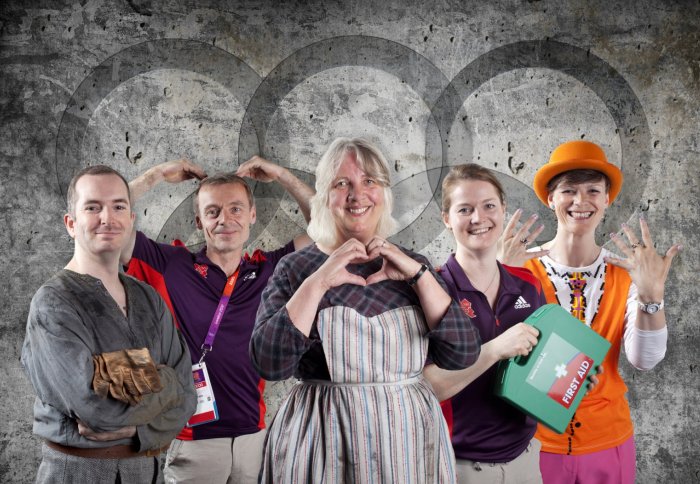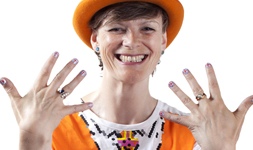Olympic Tales

L - R: Rob Millwood, Steve Matthews, Annette Woods, Maria Healy and Mary Morrell
Five members of Imperial’s community who volunteered for the London 2012 Games share their stories with Reporter.
Most of us mere spectators won’t be forgetting the London 2012 Olympic Games in a hurry but, for the volunteers who put in hours of work to make the Games happen, the memories of their hands-on experiences will linger even longer.
Tales from Imperial’s volunteers are a bit like the host city London; sometimes challenging and occasionally a bit crazy but undeniably colourful. There was one Olympics, but many stories.
Starting blocks
The selection process for becoming a volunteer is where the stories start and for many these tales resemble a normal job application process: fill in a few forms, attend an interview or two, get offered a place. Not so for Rob Millwood (Medicine), a performer in the opening ceremony, whose audition resembled a giant game of human battleships.
“There were 250 people in a room, with grid sections laid out on the floor,” he recounts. “We had to remember which grid references we were supposed to move to, as well as dance movements, in addition to a series of numbers which they’d randomly ask you to shout out. It was pretty crazy!”
Rubbing shoulders
Once they’d secured a place and completed their training, for many volunteers the fun really began once the athletes arrived. There were few who had such a hands-on role as Maria Healy, who works at Ethos as a sports and remedial massage therapist and volunteered in a similar role for the fencing teams during the Olympics.
During one of her shifts Maria noticed that her patients seemed anxious, and offered to put on some of the athlete’s favourite music to calm their pre-competition nerves. It’s not something Maria always does, but the athlete seemed to relax to the English rapper Tinie Tempah’s quick-fire beats. “You have to be mindful of where the athletes are in the competition phase and their psychology at the time,” Maria says. “Even small things like music can make a big difference.”
Some interactions with athletes were a bit more challenging, especially if, like Professor Mary Morrell (NHLI), you were tasked with making sure that the more boisterous ones behaved during the opening ceremony. “It didn’t all go to plan,” she admits. “Part of the problem was that the athletes got slightly over-excited. At one point they were trying to climb on the flowerbeds, which we knew were going to explode with white confetti and we just had to say, ‘I don’t think you should climb on those!’”
One of the biggest perks of being close to some of the world’s top sports people was the chance to meet both old and new Olympic heroes. Professor Steve Matthews (Life Sciences), who worked in the Olympic Park in the catering, cleaning and waste team, says, “I think I was 14 when Daley Thompson won his first gold medal at the 1980 Moscow Olympics, so meeting my childhood hero and getting a photo with him was definitely a highlight.”
Under pressure
The polished version of the Olympics seen on TV didn’t always match the day-to-day experiences of many volunteers. Instead lots found themselves in dull or demanding situations. Rob chuckles as he remembers Danny Boyle’s words to some of the cast who performed in the opening ceremony: “I’ve put you through hell because that’s what the industrial revolution was like.” It’s clear from Rob’s face that the sentiment rang true at times.
“There were some rehearsals when we used to sit for hours wondering what was going to happen next while the producers debated over the show,” says Annette Woods (NHLI), another performer at the opening ceremony, recounting the constant changes. “There were even minor alterations on the night.”

Mary shows off her Team GB nails
Many volunteers felt a responsibility to show London at its best, recalls Mary. “I stopped listening to the news in the run-up to the opening ceremony because I didn’t want to hear one more person say, ‘the eyes of the world will be on London’. I knew it wouldn’t be a disaster if I stood up in the wrong bit or didn’t put my arm up in the right place, but I wanted to do my best for everybody.”
For others, the downsides to volunteering were more practical, like Rob who discovered that his fireproof suit wasn’t necessarily guaranteed to do the job. This was a bit worrying as he was one of the forgers responsible for creating the Olympic rings that rose up from the centre of the stadium. Rob says: “The organisers were saying, ‘if you feel anything on fire just brush it off, you’ll be fine,’ but we didn’t know if we were on fire. We couldn’t see because of our hoods which covered our faces!”
Back to reality
Now that the Olympics are over, do any of the volunteers feel they learnt anything which might translate into their real lives? For those in the opening ceremony the answer was easy. “Patience,” they chimed in unison, reflecting on the hours spent in the rain, waiting for instructions.
Steve, whose mainly manual job of managing Coca-Cola supplies around the Olympic Park was a far cry from his academic position at Imperial, revealed that he would have more empathy for the people whose job is it to fill fridges in the future. “I worked with a huge mix of people from all over the place and that really helps to open your eyes. Hopefully I’ll bring some of that back to my job here,” he adds.
Unlike the other Imperial volunteers, Maria’s role for the Olympics was the same as her day job. She says: “My experience during these three weeks will continue to enrich my practice as a therapist. Working in such an intense, highlevel environment really inspires you to be your best, to develop and perform at your peak.”
Quiet moments
From meeting your hero to worrying about how fireproof you are, the London 2012 Olympics are going to leave indelible memories in the minds of many, especially the volunteers. But it wasn’t always the big moments which had the most impact.
Mary recounts: “At the dress rehearsal they did a mock-up of the flame coming in, the stadium was lit up and all the pixels twinkled like flames. You couldn’t see it so well on the night because the audience stood up, but for me it was these moments, the quiet moments, as well as the hoorah moments, which I’ll treasure.”
Article text (excluding photos or graphics) © Imperial College London.
Photos and graphics subject to third party copyright used with permission or © Imperial College London.
Reporter
Jessica Adams
Advancement